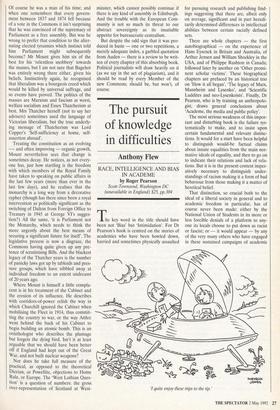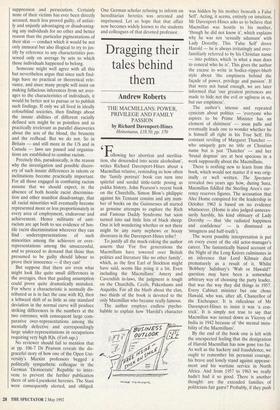The pursuit of knowledge in difficulties
Anthony Flew
RACE, INTELLIGENCE AND BIAS IN ACADEME by Roger Pearson Scott-Townsend, Washington DC (unavailable in England) $25, pp.304 The key word in the title should have been not 'Bias' but 'Intimidation'. For Dr Pearson's book is centred on the stories of academics who have been howled down, harried and sometimes physically assaulted
for pursuing research and publishing find- ings suggesting that there are, albeit only on average, significant and in part heredi- tarily determined differences in intellectual abilities between certain racially defined sets.
There are whole chapters — the first autobiographical — on the experience of Hans Eysenck in Britain and Australia, of Arthur Jensen and William Shockley in the USA, and of Philippe Rushton in Canada; followed later by another on 'Other promi- nent scholar victims'. These biographical chapters are prefaced by an historical trio on 'How it all began', 'The legacy of Marx, Mannheim and Lysenko', and 'Scientific Luddites and neo-Lysenkoists'. Finally, Dr Pearson, who is by training an anthropolo- gist, draws general conclusions about 'Academe, the media and public policy'.
The most serious weakness of this impor- tant and disturbing book is the failure sys- tematically to make, and to insist upon certain fundamental and relevant distinc- tions. It would for a start have been helpful to distinguish would-be factual claims about innate equalities from the main nor- mative ideals of equality, and then to go on to indicate their relations and lack of rela- tions. But it is in the present context imper- atively necessary to distinguish under- standings of racism making it a form of bad behaviour from those making it a matter of heretical belief.
That distinction, so crucial both to the ideal of a liberal society in general and to academic freedom in particular, has of course never been made: either by the National Union of Students in its more or less forcible denials of a platform to any- one its locals choose to put down as racist or fascist; or — it would appear — by any of the very many others who have engaged in these sustained campaigns of academic 'I quite enjoy these trips to the tip.' suppression and persecution. Certainly none of their victims has ever been directly accused, much less proved guilty, of unfair- ly and unjustly advantaging or disadvantag- ing any individuals for no other and better reason than the particular pigmentations of their skin — conduct which it would be not only immoral but also illogical to try to jus- tify by reference to any characteristics pos- sessed only on average by sets to which those individuals happened to belong.
Someone might well agree with all this but nevertheless argue that since such find- ings have no practical or theoretical rele- vance, and since many people will insist on making fallacious inferences from set aver- ages to the characteristics of individuals, it would be better not to pursue or to publish such findings. If only we all lived in ideally colourblind societies, then findings about the innate abilities of different racially defined sets might be as pointless and as practically irrelevant as parallel discoveries about the sets of the blond, the brunette and the redhead. But we do not. So in Britain — and still more in the US and in Canada — laws are passed and organisa- tions are established to combat racism.
Precisely this, paradoxically, is the reason why the investigation and possible discov- ery of such innate differences in talents or inclinations become practically important. For all those engaged in combating racism assume that we should expect, in the absence of both hostile racist discrimina- tion and other manifest disadvantage, that all racial minorities will eventually become represented more or less proportionately in every area of employment, endeavour and achievement. Hence militants of anti- racism are apt both to see evidence of hos- tile racist discrimination wherever they can find underrepresentations of such minorities among the achievers or over- representations among the unsuccessful, and to proceed to demand that those thus presumed to be guilty should labour to prove their innocence — if they can!
But suppose that there are even what might look like quite small differences in the averages, then that guiding assumption could prove quite dramatically mistaken. For where a characteristic is normally dis- tributed as is in fact the case with IQ, then a leftward shift of as little as one standard deviation in the normal curve will produce striking differences in the numbers at the two extremes; with consequent large com- parative over-representations among the mentally defective and correspondingly large under-representations in occupations requiring very high IQs. (Verb sap.)
No reviewer should fail to mention that at pp. 106-7 Dr Pearson reveals the dis- graceful story of how one of the Open Uni- versity's Marxist professors begged a politically sympathetic colleague in the German 'Democratic' Republic to inter- vene to prevent the further publication there of anti-Lysenkoist heresies. The Stasi were consequently alerted, and obliged. One German scholar refusing to inform on hereditarian heretics was arrested and imprisoned. Let us hope that that affair now becomes widely known to the students and colleagues of that devoted professor.



















































 Previous page
Previous page